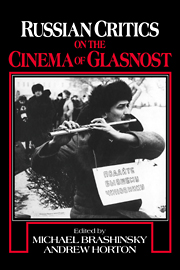Book contents
- Frontmatter
- Contents
- Acknowledgments
- Introduction
- Part One Films in a shifting landscape
- Part Two Glasnost's top ten
- I Repentance
- II Is It Easy To Be Young?
- II A Forgotten Tune for the Flute
- IV The Cold Summer of '53
- V Assa
- VI Commissar
- VII Little Vera
- VIII The Days of Eclipse
- IX The Needle
- X Taxi Blues
- Conclusion
- Directors' biofilmography
- Filmography
- About the contributors
- About the editors
- Index
II - A Forgotten Tune for the Flute
Published online by Cambridge University Press: 04 August 2010
- Frontmatter
- Contents
- Acknowledgments
- Introduction
- Part One Films in a shifting landscape
- Part Two Glasnost's top ten
- I Repentance
- II Is It Easy To Be Young?
- II A Forgotten Tune for the Flute
- IV The Cold Summer of '53
- V Assa
- VI Commissar
- VII Little Vera
- VIII The Days of Eclipse
- IX The Needle
- X Taxi Blues
- Conclusion
- Directors' biofilmography
- Filmography
- About the contributors
- About the editors
- Index
Summary
A middle-aged Moscow bureaucrat, Filimonov is stagnating in his job and marriage as perestroika becomes a reality. While he continues to practice dishonesty in his career, he begins to reawaken as the artist he once promised to be when he has an affair with a nurse. Thrown out of his home by his wife when she discovers his infidelity, he takes up an uneasy residence at the nurse's communal apartment and then, briefly, on the street after she rejects him. When all seems lost, Filimonov's wife takes him back and he gets promoted. But when he sees his former lover on the street, he drops dead of a heart attack, only to be revived by her. Will they live happily ever after?
A Forgotten Tune for the Flute [Zabytaya melodiya dlyafleity). Directed by Eldar Ryazanov; screenplay by Emil Braginsky and Ryazanov; cinematography by Vadim Alisov; production design by Alexander Borisov; music by Andrei Petrov. Cast: Leonid Filatov, Tatyana Dogileva, Irina Kupchenko, Vsevolod Sanayev, Olga Volkova, Valentin Gaft, and Alexander Shirvindt. Color, 95 min. Mosfilm Studios production, 1987.
3. “Spare some for a former bureaucrat,” reads the sign worn by Filimonov (Leonid Filatov), whose career-seeking, self-serving life-style has led him to forget many tunes in Eldar Ryazanov's A Forgotten Tune for the Flute(1987), glasnost's first satirical melodrama. (Photo: Kinocenter and Sovexportfilm.)
What's our life? A musical piece?
A sonata or a fugue or a mass,
a suite, a nocturne or a scherzo?
–Eldar RyazanovDirector Vladimir Menshov once complained that, until recently, our cinema served tastes of “either the official apparatus or the snobbish elite.”
- Type
- Chapter
- Information
- Russian Critics on the Cinema of Glasnost , pp. 69 - 78Publisher: Cambridge University PressPrint publication year: 1994



